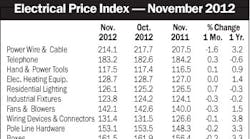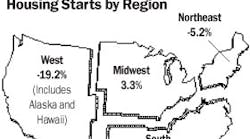Latest from Mag
People - Dec 21, 2012
Obituaries - Dec 21, 2012
November EPI Index Shows No Change
Housing Starts Dip 4% in November
Electrical Marketing - December 21, 2012
Around the Industry - Dec 21, 2012
Graybar Electric Co., St. Louis, is taking a public stand against private-labeling.
“It has come to our attention that the distribution industry is, in some ways, having an identity crisis,” Graybar said in an ad appearing in the May issue of TED magazine. “It’s started to dabble in the manufacturing business. Suppliers have noticed this development as well. As a distributor, we believe it’s critical that we distribute our suppliers’ products, not develop and market our own. So, we simply refuse to do it.”
Private labeling is a highly charged topic in the electrical industry these days, and Electrical Wholesaling’s recent series of articles on it seems to have touched a raw nerve. The articles, written by Allen Ray, president, Allen Ray Associates, Kennedale, Texas, and David Gordon, president, Channel Marketing Group, Raleigh, N.C., were based on surveys of electrical distributors, electrical contractors and other end users. The results of the end-user survey, which will be published in Electrical Wholesaling’s May issue, indicate that some end users perceive Graybar to be a private labeler. Approximately 20 percent of the end-user respondents said they know at least one distributor selling private-label products. Of those respondents, 12.1 percent said they believe Graybar private labels some products.
Dawn Ouchi, Graybar’s manager of public and media relations, said Graybar does not private-label any products, and she drew a clear distinction between what the electrical industry generally considers to be privately labeled products and the two “co-labeled” products Graybar markets. “To us, private labeled products are brought to market outside the traditional distributor-supplier channel,” she said. “Our two co-labeled products were produced with the suppliers and they actually have the suppliers’ names on them.”
She said in one instance, one of Graybar’s top suppliers asked the company to private label a wire-fishing product in conjunction with them. “It was developed very closely in conjunction with our supplier,” said Ouchi. “Our stand is that we are going to work with the supplier to distribute their products. The product that we developed jointly benefited us both, and that’s the whole idea. We want to make sure that we’re working with the suppliers to the benefit of the customer.”
One of the reasons contractors may be mentioning Graybar’s name in the survey, she said, is because of the visibility of the PolyLine product, which comes in a big 5-gallon bucket that Graybar displays in its counter area.
In another case, she said Metallics Inc., Bristol, Conn., makes some hardware for the company, and that it sells the hardware under the Graybar logo. “It was one of those things that we did in conjunction with the supplier again,” she said. “We want to work directly with our suppliers. We’re not in pursuit of developing any new private-label products. These are just things that have been in existence for a while, and it’s not part of our strategy at all to continue to do that.”
Graybar has a long history of promoting its vendors’ brands. Its popular “Contractor John” series of advertisements that ran in end-user magazines for years promoted its electrical manufacturers’ brands.
Reaction to Graybar’s position on private-labeling was positive.
“From the rep perspective we are delighted with Graybar’s stance,” said Hank Bergson, president of the National Electrical Manufacturers Representatives Association (NEMRA), Tarrytown, N.Y. “NEMRA reps represent the top branded names in the electrical industry and our members’ ability to have the resources to provide services to the distribution channel and to the ultimate customers is dependent upon the sale of the branded products to generate the income to pay for them.”

